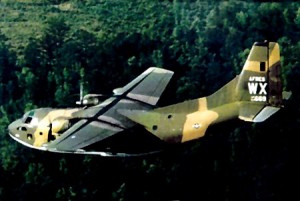12/5/2011 by Ed Timperlake
Through a coincidence of timing and chance I recently met a retired USAF officer who has never forgotten the aviators’ duty to take care of one’s aircrew. He visited the Washington DC DAV Office, spreading the word about fellow Air Force flyers in distress due to exposure to dioxin contamination remaining on their aircraft after use in Vietnam.

The planes sprayed Agent Orange during the war and were used for a decade afterwards in regular airlift and aeromedical evacuation missions, leaving the post-war flyers at great risk to their health.
Air Force tests, beginning in 1994, confirmed the contamination and labeled the aircraft “heavily contaminated” and “a threat to public health.” The last of the aircraft, too contaminated for landfill, were destroyed by smelting in 2010.
Major Wesley T Carter USAF (ret.), a life member of the DAV since his injuries during the Persian Gulf War, is on a mission to help his fellow Air Force warriors. With a sense of hopeful confidence he described to me visiting all former C-123 bases and museums with static display aircraft. His mission: Researching the planes’ contamination and raising awareness at the Department of Veterans Affairs about the men and women veterans who flew the C-123 “Ranch Hand” aircraft in the years following the Vietnam War.
He has a significant problem in convincing the VA to treat C-123 crews’ illnesses—the way the VA makes service connection to battlefield toxins like Agent Orange relies on studies using statistical information showing the impact of health issues is above that of the general population. Tragically this process takes time and that maybe the most precious commodity that these veterans simply don’t have left to them!
Their proof of exposure, having flown contaminated airplanes for a decade, should be enough to satisfy VA rules. Researchers at the Oregon Health Sciences University and Columbia University’s School of Public Health have agreed!
www.c123kcancer.blogspot.com is an excellent reference site and explains the health issues extremely well. Their hope is that the VA will consider their “boots on the airplane” much the same way the government treats “boots on the ground” for Vietnam War veterans regarding Agent Orange exposure.
Please get the word out to any former C-123 crew and their families to go to the web site and engage on the issue. And very importantly, please let your legislators know that these veterans must have their health concerns addressed.
Thanks to Major Carter and other C-123 veterans, we trust the VA will soon recognize that these men and woman crewmembers are paying a price for their service and the American people will support them through congressional action and pressure on the Department of Veterans Affairs.


